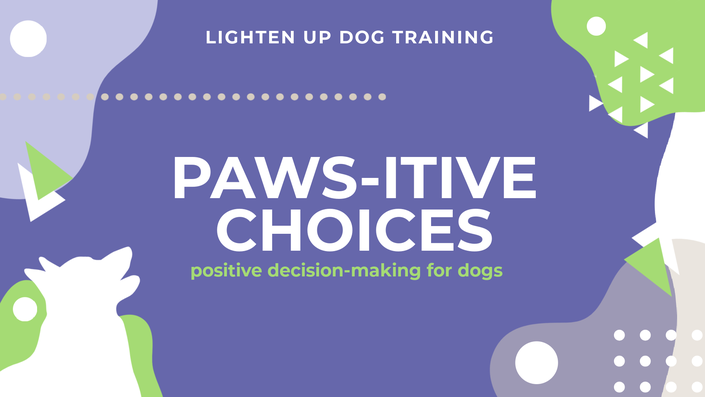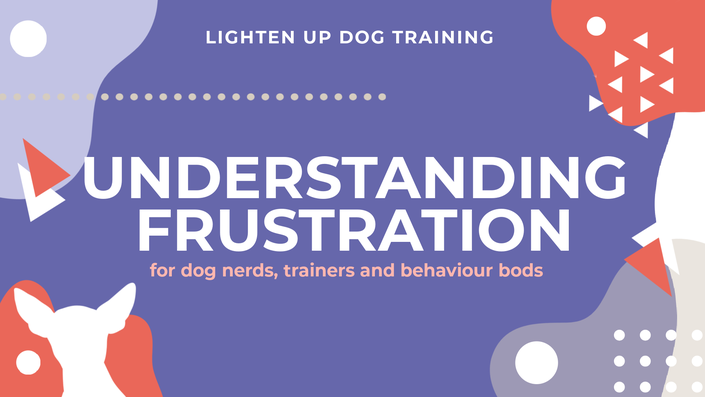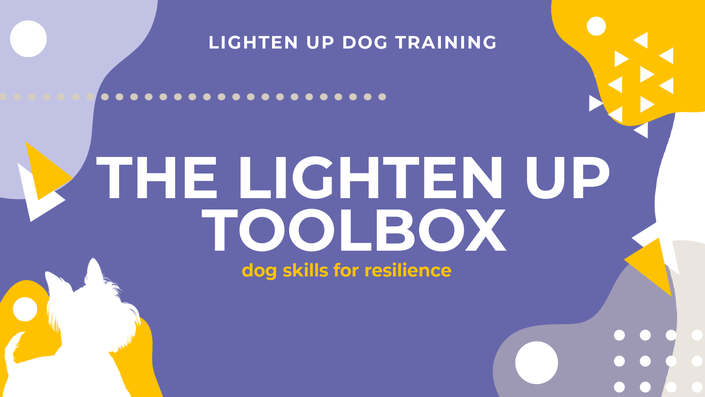THIS COURSE IS CLOSED FOR ENROLMENT
SIGN UP TO THE WAITLIST
Truly the first of its kind: over 60 hours of video recordings,
case studies, papers, discussion and live sessions.
Enrolment re-opens on Monday 01 December 2025
and the course will go live on Monday 05 January 2026.

ABOUT THIS COURSE
Impulsivity is often seen as one single phenomenon where a diverse range of behaviours are treated with the same programmes.
Sometimes, it's seen as a niche topic for people training working lines of dogs, a character flaw without clear support programmes.
Punishment and corrections are justified as necessary for these highly responsive dogs. Rewards can never hope to compete with strong motivation, right?
Impulsivity can manifest in many different ways, leaving guardians wondering if their dog has some kind of rage syndrome, OCD or ADHD.
Worse, when less skilled trainers have attempted to use punishment, there can be devastating fallout, leaving us to try to pick up the pieces.
Often, these dogs are written off as high maintenance or flawed in some way. They end up labelled as problematic, predatory or chasey, labelled "high drive" with few solutions.
Many end up in shelters or being rehomed time after time. Our highly responsive dogs can often be highly sensitive too.
Their problem behaviours can even end in euthanasia where aggression, reactivity or predation put them into conflict with the world around them.
Here, we change the narrative.
We appreciate that impulsivity is the dark side of trainability and responsiveness, and we work to create effective partnerships to help support our dogs more effectively.

ADHD or...
If you've got clients who arrive saying they think their dog has ADHD or OCD ... you're probably dealing with dogs who struggle with focus. They can be real novelty seekers, noticing everything, unable to focus on anything for a long time. They can also struggle with hyperfixation, where they are unable to disengage from highly motivating activities. Focus and distraction are key issues for them.

Responsive or Impulsive?
Dogs bred for highly responsive behaviour such as herding breeds, terriers and bull breeds, spaniels and shepherds are often demonised as having impulse control problems. They notice everything and struggle without guidance. Learn how to give their lives structure and support so that they don't end up getting into trouble because of their lightning-fast decisions and responses.

Focused Support
More than any other dog, our impulsive dogs are in need of our support. They may need our help in learning how to regulate physiologically, emotionally or cognitively. Some seem unable to 'calm down' or settle, where others struggle to dial down the size of their behaviours. This can affect their relationships with other animals as well as their relationship with their caregivers.
YOU WILL GET:
-
A FREE introductory module with 5 hours of bonus materials on frustration in dogs.
-
Your own copy of the Lighten Up FRUSTRATION assessment and an exclusive copy of the brand new Lighten Up IMPULSIVITY assessment.
-
6 modules to watch when you want, however many times you want complete with transcripts, worksheets, action plans and relevant research papers
-
10+ case studies, their training plans and the outcomes for each dog.
-
Theory AND practical examples from biology and neuroscience right through to complex social behaviour covering aggression, reactive behaviour, chasing, predation and highly motivated behaviour.
-
A dedicated social space to ask questions and get answers, plus 12 weekly LIVE sessions.
-
Over 40 hours of recordings to watch at your leisure.
-
Lifetime membership so you can keep up to date.

WHY WE NEED TO UNDERSTAND IMPULSIVITY
When we first start working with dogs, we may feel like we're not as well-equipped to tackle certain behaviours as we'd like to be. This is especially true for all the B-I-G behaviours that are intense or quickfire.
We might have done a couple of courses aimed at one breed or another. Breed specialists really understand their dogs inside-out, but it's left to us to connect the dots. Plus, we can't go on every specialist course for X or Y breed in order to help our clients out!
Even then, impulsivity is often treated as one single, solid, well-defined concept.
In reality, it's much more nuanced than that.
A dog who goes from 0-100 in a millisecond is not the same as a dog who struggles to focus in novel environments. A dog who struggles with frustration is not the same as a dog who is sensitive to punishments and penalties.
Unpacking the whole amorphous blob and looking at it as an individualised palette can really help.
We can then develop individualised training programmes that get right to the heart of the matter from the very beginning.
After that, everything gets easier... loose leash, recall, focus, working around distractions... all the things our client's dogs might struggle with.
ABOUT YOUR HOST
Having lived and worked with shepherds, bull mixes, collie crosses and spaniels for the last fifteen years, I know from the inside how responsiveness and trainability can affect behaviour.
Most of my clients in private practice have also posed problems before their guardians truly understood them. I get to take their experience, wrap it up into a neat little course and share their successes with you.
Because I work in the heart of dog training and rescue, I know the challenges of living with dogs who struggle. In fact, many of the dogs I work with or have lived with have been somebody else's 'Nightmare On Legs' before they arrived with me, so I feel especially blessed to now be able to take this to a wider audience.
That even includes Flika, who had seven homes before she landed with me!
I've had plenty of excellent canine teachers who've shown me the way. You'll meet some in the case studies. The dogs I've worked with over the last 10 years have helped me understand how best to support our highly responsive canine friends.

COURSE CURRICULUM
- Module 01 Introduction (12:24)
- Definitions: distinguishing distinct concepts (49:01)
- Four ways to consider impulsivity (52:10)
- Measuring responses (60:30)
- The function of impulse control factors (49:42)
- The neurobiology of impulsivity (48:05)
- Reflexes: stimulus & response (61:15)
- Inhibition (67:33)
- Stimulus salience and attention (61:17)
- Habituation & Sensitisation (65:15)
- Ethical concerns when working with impulsivity (35:19)
- Physiological, emotional, cognitive and social regulation (75:38)
- Module 01 plenary (15:13)
- BONUS MATERIALS 2025: Taxis and behaviour systems (124:58)
- Module 02 Introduction (18:47)
- Heritability, traits and Impulsivity (49:00)
- Motivation (60:46)
- Expectancy and goals (51:59)
- Respondent Extinction (42:04)
- Operant Extinction (58:37)
- The 'Wanting' and 'Liking' circuits: impulsivity and behaviour (64:40)
- cues, sign tracking & impulsivity (55:18)
- Module 02 plenary (16:51)
- Module 03 Introduction (10:58)
- Intrinsic vs Extrinsic motivating factors (37:15)
- Arousal (60:52)
- Baumeister's Radishes: Executive function, cognitive load and frustration (51:07)
- Fast but inefficient: hot responses and delayed gratification (61:23)
- novelty seeking vs sensation seeking - high responders vs low responders (68:17)
- Anxiety, arousal and fear responses (71:11)
- Reward responsiveness (40:28)
- Super sticky learning (46:47)
- Module 03 plenary (19:14)
- Module 04 Introduction (15:31)
- Heritable influences on impulsivity (45:08)
- Pre and postnatal influences on responsiveness and regulation (57:50)
- Regulating the responsive junior: why partnerships matter (71:15)
- Establishing the Eight Attributes of Effective Regulation (63:21)
- Impulsivity and adolescence (62:26)
- Working with the responsive adolescent dog (49:56)
- A recipe for responsiveness and regulation (58:20)
- Module 04 Plenary (12:55)
- Module 05 Introduction (13:49)
- Case Study 1: Maya and consequence insensitivity (56:17)
- Case Study 2: Bernie and punishment sensitivity (61:30)
- Case Study 3: Charlie and the Birds (61:01)
- Case Study 4: Rudy and the Fluffy Dummy (60:17)
- Case Study 5: Attila, who ruled the house (42:21)
- Case Study 6: Billy the Collie, agility and the Radish Failure (50:19)
- Case Study 7: Bunny and puppy responsiveness (50:38)
- Case Study 8: Lidy and living with an impulsive dog (71:37)
- Module 05 plenary (16:00)
- Module 06 Introduction (20:23)
- Building a picture of a dog: their unique profile (47:43)
- Helping clients come to terms with their impulsive dog (57:52)
- Supercharging the learning process (43:55)
- Priming & Renewal Cues (73:40)
- Proprioception and Movement (67:31)
- Working around distractions (57:08)
- Building Frustration Tolerance (44:39)
- Using human-dog play to build skills (41:00)
- Building focus: engagement, disengagement and duration focus (40:49)
- Module 06 Plenary (49:34)




